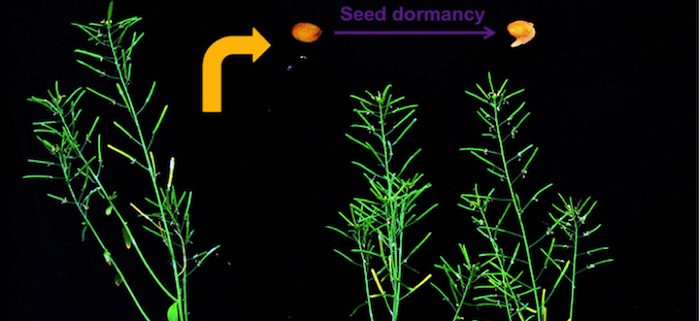Making Seeds Sleep at the Proper Time
Li et al. identify a module regulating seed dormancy in Arabidopsis. Plant Cell (2019). https://doi.org/10.1105/tpc.18.00449
By Xiaoying Li
Background: Grain crop production is important for human survival. Pre-harvest sprouting is a worldwide natural disaster that seriously affects crop yields and quality. Proper seed dormancy could prevent pre-harvest sprouting. However, long dormancy periods can have adverse effects that directly influence the germination rates of seeds, resulting in low seedling emergence rates in the field, thereby causing unnecessary waste. It is of great theoretical and practical importance to study the molecular regulatory mechanism of seed dormancy. Seed dormancy is regulated by a variety of plant hormones. Ethylene plays an important role in the regulation of seed dormancy, but little is known about the underlying molecular mechanism.
Questions: The ethylene receptor ETR1 is involved in regulating seed dormancy, but the downstream regulators are unknown. We aimed to identify a molecular module regulated by ethylene that controls seed dormancy in Arabidopsis thaliana and to fill the gaps in our understanding of the regulatory network of seed dormancy.
Findings: Through analysis of the reduced dormancy 3 (rdo3) mutant, we identified RDO3 as ETR1 and showed that ETHYLENE RESPONSE FACTOR12 (ERF12) functions downstream of ETR1 to regulate seed dormancy. ERF12 forms a repressor complex with TOPLESS (TPL) and binds to the DELAY OF GERMINATION1 (DOG1) promoter, thereby inhibiting its expression and regulating seed dormancy. ERF12 could represent a link between the ethylene and DOG1 pathways in the regulation of seed dormancy in Arabidopsis. Since ETR1 is an ethylene receptor, it is located at the beginning of the ethylene signal transduction pathway. The crosstalk between the ethylene pathway and other pathways occurs via multiple layers with kinases and other regulators. Our findings uncover at least part of the molecular mechanisms by which ethylene regulates seed dormancy through the ETR1/RDO3-ERF12/TPL-DOG1 module.
Next steps: Transcriptome analysis showed that the kinase genes MKK9 and MPK14 are significantly upregulated in rdo3. The MKK9 and MPK14 transgenic lines showed reduced seed dormancy, pointing to their negative roles in regulating seed dormancy. Our future work will explore how MKK9 and MPK14 respond to ETR1 and transmit signals to ERF12.
Xiaoying Li, Tiantian Chen, Yu Li, Zhi Wang, Hong Cao, Fengying Chen, Yong Li, Wim JJ Soppe, Wenlong Li, Yongxiu Liu (2019). ETR1/RDO3 Regulates Seed Dormancy by Relieving the Inhibitory Effect of the ERF12-TPL Complex on DELAY OF GERMINATION1 Expression. Plant Cell 31: xxx; DOI: https://doi.org/10.1105/tpc.18.00449
Key words: Seed dormancy, ETR1, ERF12/TPL, DOG1




